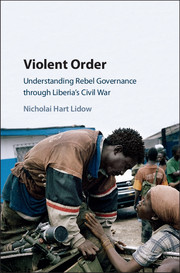Book contents
- Frontmatter
- Contents
- List of Figures
- List of Tables
- Preface
- Acknowledgments
- List of Abbreviations
- PART I REBEL ORGANIZATION
- 1 Understanding Rebel Organizations
- 2 Leaders, Commanders, and Soldiers
- 3 External Patrons
- PART II LIBERIA'S CIVIL WAR
- PART III BEYOND LIBERIA
- Appendix A Fieldwork in Liberia
- Appendix B Interviews
- Bibliography
- Index
1 - Understanding Rebel Organizations
from PART I - REBEL ORGANIZATION
Published online by Cambridge University Press: 12 October 2016
- Frontmatter
- Contents
- List of Figures
- List of Tables
- Preface
- Acknowledgments
- List of Abbreviations
- PART I REBEL ORGANIZATION
- 1 Understanding Rebel Organizations
- 2 Leaders, Commanders, and Soldiers
- 3 External Patrons
- PART II LIBERIA'S CIVIL WAR
- PART III BEYOND LIBERIA
- Appendix A Fieldwork in Liberia
- Appendix B Interviews
- Bibliography
- Index
Summary
TWO COMMANDERS
By the time the National Patriotic Front of Liberia (NPFL) launched its invasion of Liberia on Christmas Eve, 1989, General Johnson T. Leamah had been a member of the group for three years. Leamah was once a soldier in Liberia's national army but fled the country when the dictator, Samuel Doe, purged members of Leamah's Gio ethnic group from the military. Languishing in the refugee camps of neighboring Côte d'Ivoire, Leamah heard that Charles Taylor, a former government official, had secured support from Libya and other patrons to overthrow the brutal Doe regime. Leamah was initially skeptical but decided to join Taylor when he learned that he was related to Taylor's wife, Agnes – she shared Leamah's Gio ethnicity and grew up in a village close to his home. As far as Leamah could tell, Charles Taylor had connections to every government and businessman in the region and offered the best chance for one day returning home.
After two years of fighting, Leamah commanded nearly four thousand soldiers from his base in the southeastern Liberian town of Buchanan and had authority over several hundred square miles. His primary responsibility was to secure the area from attacks, but Leamah was also expected to protect civilians and provide security for the multinational corporations that operated in NPFL territory. The job was not easy. In addition to planning military operations, Leamah deployed escorts for logging trucks and constructed a training base for new recruits. He organized a system of taxation to collect food without looting civilians and punished soldiers who misbehaved. Because of these actions, civilians in many areas were protected from abuse and continued to farm and engage in market activity.
Leamah's efforts were rewarded by Charles Taylor. Taylor made frequent, impromptu visits to Leamah's territory and gave him $15,000 in cash or more at each visit. Leamah was grateful for the rewards and knew that other, less successful commanders had been transferred to the frontlines or killed as punishment for failure. He also expected to benefit after the war.
- Type
- Chapter
- Information
- Violent OrderUnderstanding Rebel Governance through Liberia's Civil War, pp. 3 - 31Publisher: Cambridge University PressPrint publication year: 2016

